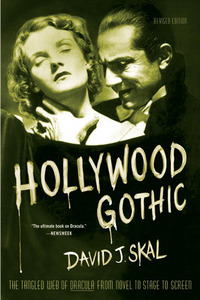Take a photo of a barcode or cover
12 reviews for:
Hollywood Gothic: The Tangled Web of Dracula from Novel to Stage to Screen
David J. Skal
12 reviews for:
Hollywood Gothic: The Tangled Web of Dracula from Novel to Stage to Screen
David J. Skal
The first “grown up” book I ever read in my life was Dracula, around age 10/11. It was the first book to give me nightmares and the beginning of my lifelong fascination with Vampyric lore and Vampiric media. (I mean, I actually got a vampire tattoo literally a week ago)
This was exactly what I wanted it to be. Immensely interesting and filled with fun facts, this book tells the story of Dracula’s long lived Hollywood legacy. I was thoroughly impressed with Skal’s research, and the story structure made it easy to follow over a century of Dracula history.
Of course, as an avid Dracula fan, I did know a few pieces of info prior to reading this book, but so much of this story was new to me that it didn’t feel redundant.
I definitely will be picking up some more of Skal’s books in the future.
Graphic: Alcoholism, Body horror, Death, Gore, Mental illness, Violence, Xenophobia, Blood, Medical content, Cannibalism, Medical trauma, Murder, Cultural appropriation, Alcohol
Moderate: Child abuse, Child death, Genocide, Misogyny, Racism, Rape, Sexual content, Slavery, Terminal illness, Toxic relationship, Grief, Death of parent, Outing, Toxic friendship, War, Injury/Injury detail, Pandemic/Epidemic
Minor: Ableism, Adult/minor relationship, Cancer, Cursing, Kidnapping, Religious bigotry, Car accident, Lesbophobia, Fire/Fire injury







